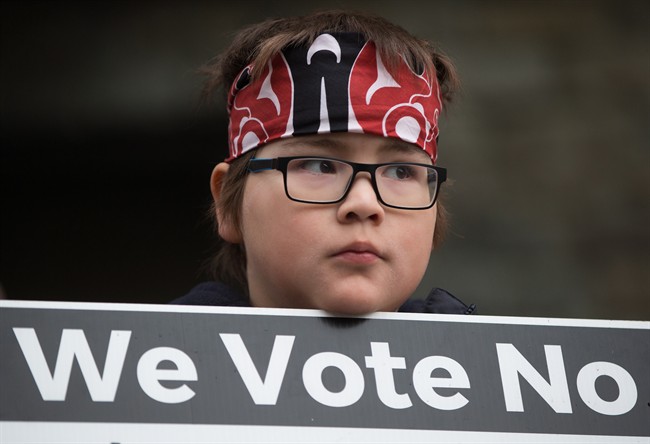Opposition is mounting against the proposed expansion of the Trans Mountain pipeline as three First Nations launch fresh legal challenges aimed at stymying a project they say was approved without proper consultation.

Representatives from the coastal Tsleil-Waututh and Squamish nations, as well as the Coldwater Indian Band near Merritt in B.C.’s Interior, told reporters Tuesday that the federal government failed to meaningfully include them in the planning and review process before approving Kinder Morgan Canada’s $6.8-billion project.
The controversial expansion would run from near Edmonton to Burnaby, B.C., and would triple the existing pipeline’s capacity. It is also expected to increase tanker traffic seven-fold within the densely populated Burrard Inlet.
Chief Lee Spahan of the Coldwater Indian Band said he has serious concerns over the government’s decision to approve a route that poses unacceptable risks to his community’s drinking water, should the Coldwater Valley watershed be contaminated.
“The Crown acknowledged if there were a spill or release from the pipeline, it would be impossible to remediate our aquifer to potable standards,” Spahan said. “In other words, we would never be able to drink our water again.”
Spahan said Kinder Morgan identified a safer, albeit more costly, alternative route but withdrew the option from the National Energy Board’s consideration without consulting or notifying the Coldwater nation.
“For Coldwater, this is about our drinking water. It is our Standing Rock,” he said, referencing the high-profile protests in the United States against a pipeline the Standing Rock Sioux say threatens their water supply.
The federal government did not respond to requests for comment.
Prime Minister Justin Trudeau approved the Trans Mountain project last November with 157 conditions that were laid out by the National Energy Board. He said he expects the decision to be “bitterly disputed,” but ultimately it is in Canada’s best interest.
READ MORE: Justin Trudeau halts Northern Gateway, approves Kinder Morgan expansion, Line 3
Squamish Chief Ian Campbell described the federal government’s efforts at consultation as little more than lip service.
“We talk about an era of reconciliation but we do not see the actions that go with that,” Campbell said.
“We’re at a milestone in Canadian history, an opportunity to mature as a society where the old status quo will no longer be acceptable, that of a colonial imposition to run roughshod over aboriginal rights and title within our own homelands and waters.”
Elected councillor Charlene Aleck of the Tsleil-Waututh said at least five First Nations have filed legal challenges since Trans Mountain received federal approval.
In an emailed statement, Kinder Morgan said it has been working with Coldwater since 2013 with discussions focusing on rights and title, as well as the environment, including protecting the nation’s water source.
READ MORE: Trudeau government pipeline approval challenged in court
“We share the same objective of ensuring the construction and operation of the project minimizes impacts to the environment and, specifically, the Coldwater aquifer,” the email reads.
On its website, Kinder Morgan says it has signed 51 community benefits agreements with First Nations worth more than $400 million, including all the First Nations whose reserves the pipeline crosses and 80 per cent of the First Nations in close proximity to the project.
But Campbell said buy-in from one nation does not equate to buy-in from all.
“We are distinct First Nations across Canada,” he said.
“We are responsible for decisions within our own homelands and waters. Therefore, the one third or so of First Nations that have signed on, that is their choice, their autonomy to make those decisions within their own territories.”
READ MORE: Trans Mountain pipeline expansion approved by B.C. government
Last week, the B.C. government gave its blessing to the project after securing a revenue-sharing agreement with the federal government that could see the province bring in more than $1 billion over 20 years.
READ MORE: Notley applauds B.C. approval of Trans Mountain project, blasts Fonda for anti-oilsands comments



Comments